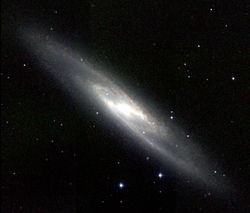Sculptor Group
| Sculptor group | |
|---|---|
 | |
| Observation data (Epoch J2000) | |
| Constellation(s) | Sculptor/Cetus |
| Right ascension | 00h 48m [1] |
| Declination | −25° 17′[1] |
| Brightest member | Sculptor Galaxy (NGC 253)[2][3][4] |
| Number of galaxies | 13[2][3] |
| Other designations | |
| NGC 253 Group, LGG 4, Sculptor Filament,[3] South Polar Group, South Galactic Pole Group[4] | |
The Sculptor Group is a loose group of galaxies[2][3] near the south galactic pole.[1] The group is one of the closest groups of galaxies to the Local Group; the distance to the center of the group from the Milky Way is approximately 3.9 Mpc (12.7 Mly).[3]
The Sculptor Galaxy (NGC 253) and a few other galaxies form a gravitationally-bound core in the center of this group. A few other galaxies at the periphery may be associated with the group but may not be gravitationally bound. Because most of the galaxies in this group are actually weakly gravitationally bound, the group may also be described as a filament.[2][3] It is considered to be at an early stage of evolution in which galaxies are still falling into the group along filamentary structures.[5]
Members
The table below lists galaxies that have been identified as associated with the Sculptor Galaxy (and hence associated with the group) by I. D. Karachentsev and collaborators.[2][3]
| Name | Type[6] | R.A. (J2000)[6] | Dec. (J2000)[6] | Redshift (km/s)[6] | Apparent Magnitude[6] |
|---|---|---|---|---|---|
| IC 1574 | IM(s)m | 00h 43m 03.8s | −22° 14′ 49″ | 363 ± 4 | 15.1 |
| NGC 59[5] | SA(rs)0 | 00h 15m 25.1s | −21° 26′ 39.8″ | 362 ± 10 | 13.1 |
| NGC 247 | SAB(s)d | 00h 47m 08.5s | −20° 45′ 37″ | 156 ± 2 | 9.9 |
| NGC 625 | SB(s)m | 01h 35m 04.6s | −41° 26′ 10″ | 396 ± 1 | 11.7 |
| NGC 7793 | SA(s)d | 23h 57m 49.8s | −32° 35′ 28″ | 227 ± 2 | 10.0 |
| PGC 2881 | IABm | 00h 49m 20.9s | −18° 04′ 32″ | 16.5 | |
| PGC 2933 | IAB(s)m pec | 00h 50m 24.3s | −19° 54′ 24″ | 16.6 | |
| PGC 6430 | IB(s)m | 01h 45m 03.7s | −43° 35′ 53″ | 391 ± 2 | 12.7 |
| Sculptor-dE1[5] | dE | 00h 23m 51.7s | −24° 42′ 18″ | 16.9 | |
| Sculptor Dwarf Irregular Galaxy (PGC 621) |
IBm | 00h 08m 13.4s | −34° 34′ 42″ | 221 ± 6 | 15.5 |
| Sculptor Galaxy (NGC 253) |
SAB(s)c | 00h 47m 33.1s | −25° 17′ 18″ | 243 ± 2 | 8.0 |
| UGCA 15 | IB(s)m | 00h 49m 49.2s | −21° 00′ 54″ | 295 ± 0 | 15.2 |
| UGCA 442 | SB(s)m | 23h 43m 45.5s | −31° 57′ 24″ | 267 ± 2 | 13.6 |
The object names used in the above table differ from the names used by Karachentsev and collaborators. NGC, IC, UGC, and PGC numbers have been used when possible to allow for easier referencing.
Foreground galaxies
The irregular galaxy NGC 55, the spiral galaxy NGC 300, and their companion galaxies have been considered by many researchers to be part of this group. However, recent distance measurements to these and other galaxies in the same region of the sky show that NGC 55, NGC 300, and their companions may simply be foreground galaxies that are physically unassociated with the Sculptor Group.[2]
References
- ^ a b c "NASA/IPAC Extragalactic Database". Results for NGC 253, identified as the core of the Sculptor Group. Retrieved 2006-11-25.
- ^ a b c d e f I. D. Karachentsev; E. K. Grebel; M. E. Sharina; A. E. Dolphin; D. Geisler; P. Guhathakrta; P. W. Hodge; V. E. Karachentseva; A. Sarajedini; P. Seitzer (2003). "Distances to nearby galaxies in Sculptor". Astronomy and Astrophysics. 404 (1): 93–111. arXiv:astro-ph/0302045. Bibcode:2003A&A...404...93K. doi:10.1051/0004-6361:20030170.
- ^ a b c d e f g I. D. Karachentsev (2005). "The Local Group and Other Neighboring Galaxy Groups". Astronomical Journal. 129 (1): 178–188. arXiv:astro-ph/0410065. Bibcode:2005AJ....129..178K. doi:10.1086/426368.
- ^ a b Burnham, Robert (1978). Burnham's Celestial Handbook; An Observers Guide to the Universe Beyond the Solar System; Volume Three, Pavo Through Vulpecula. Dover Publications, Inc. p. 1736. ISBN 0-486-24065-7.
- ^ a b c Lianou, S.; et al. (February 2013), "Population gradients and photometric metallicities in early- and transition-type dwarf galaxies: Clues from the Sculptor group", Astronomy & Astrophysics, 550: A7, Bibcode:2013A&A...550A...7L, doi:10.1051/0004-6361/201219959.
- ^ a b c d e "NASA/IPAC Extragalactic Database". Results for various galaxies. Retrieved 2006-11-25.
